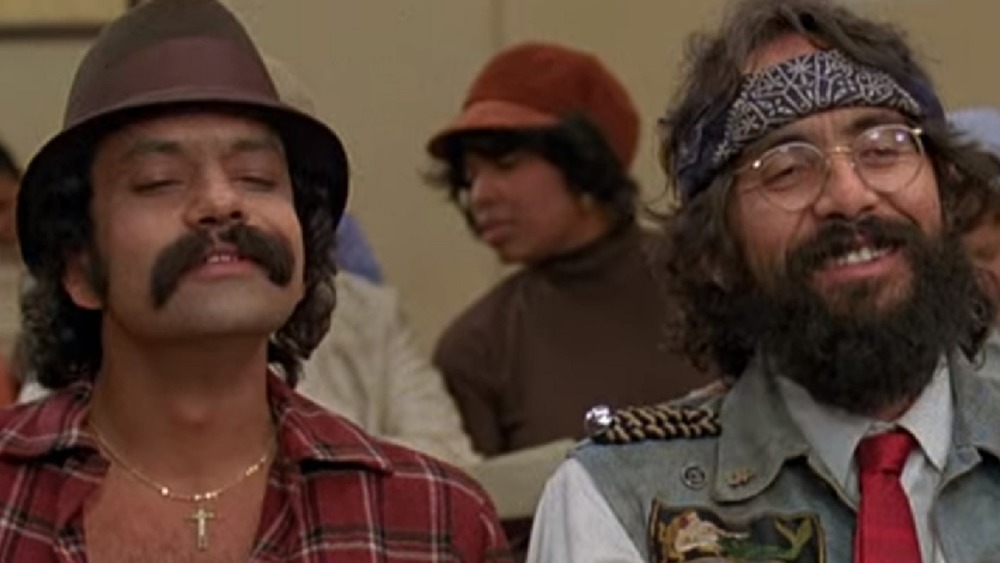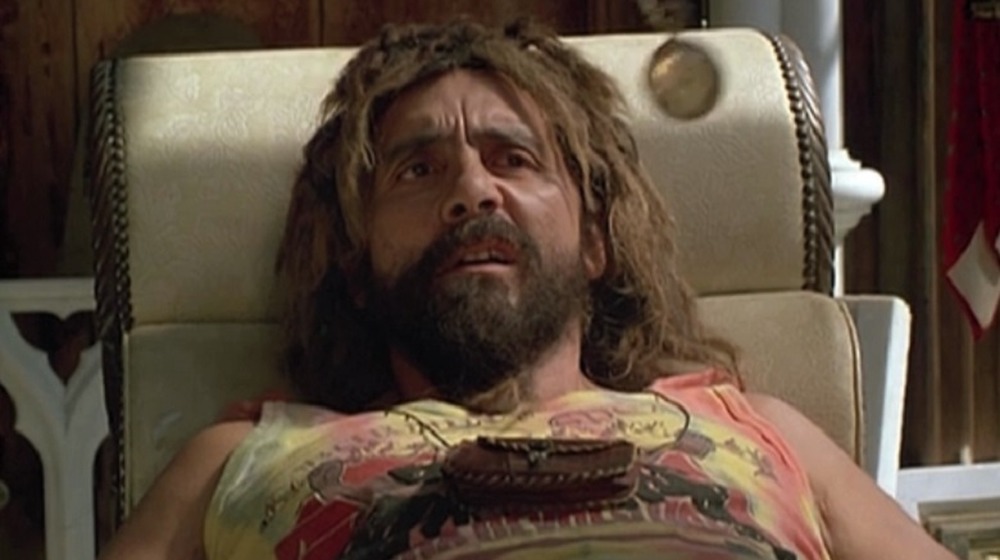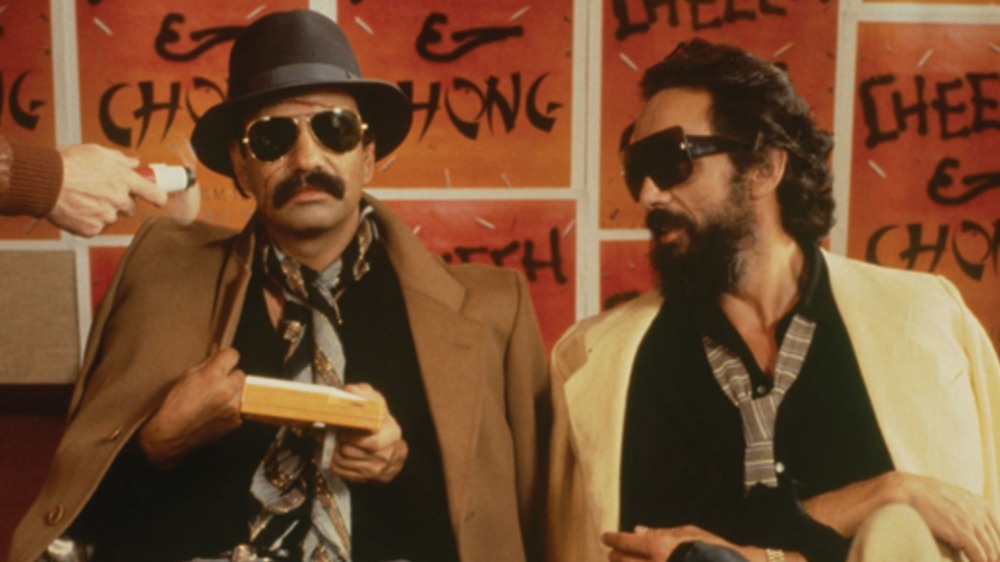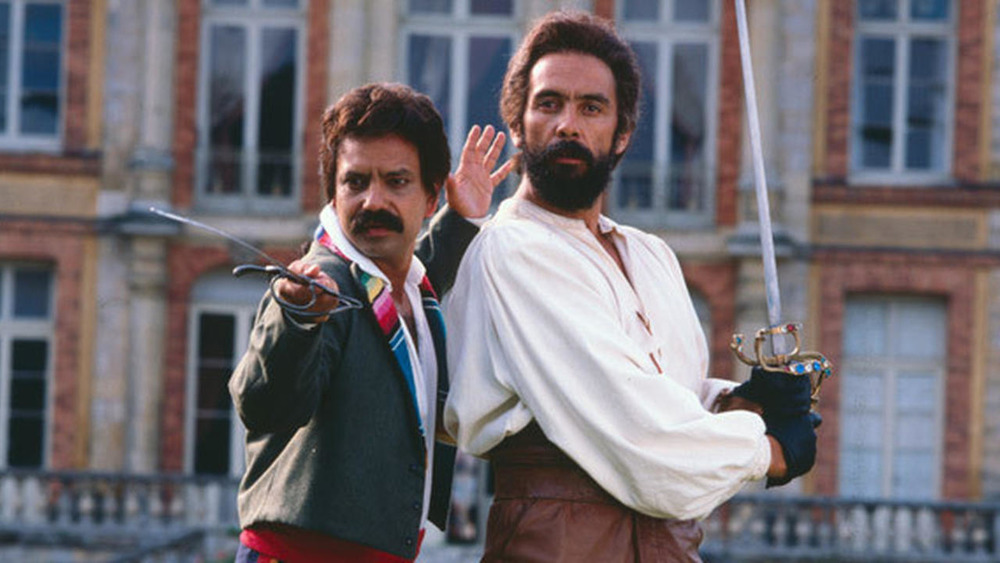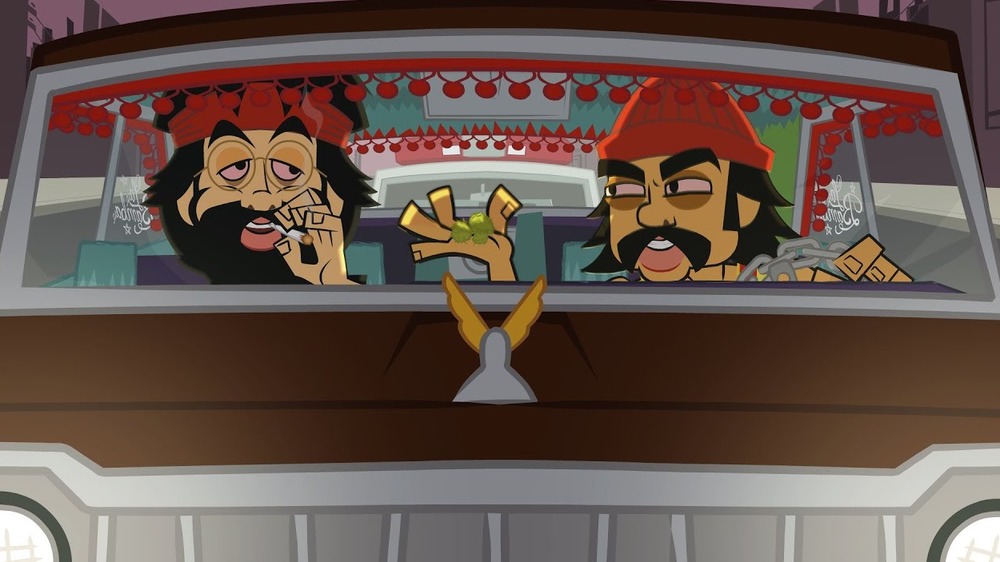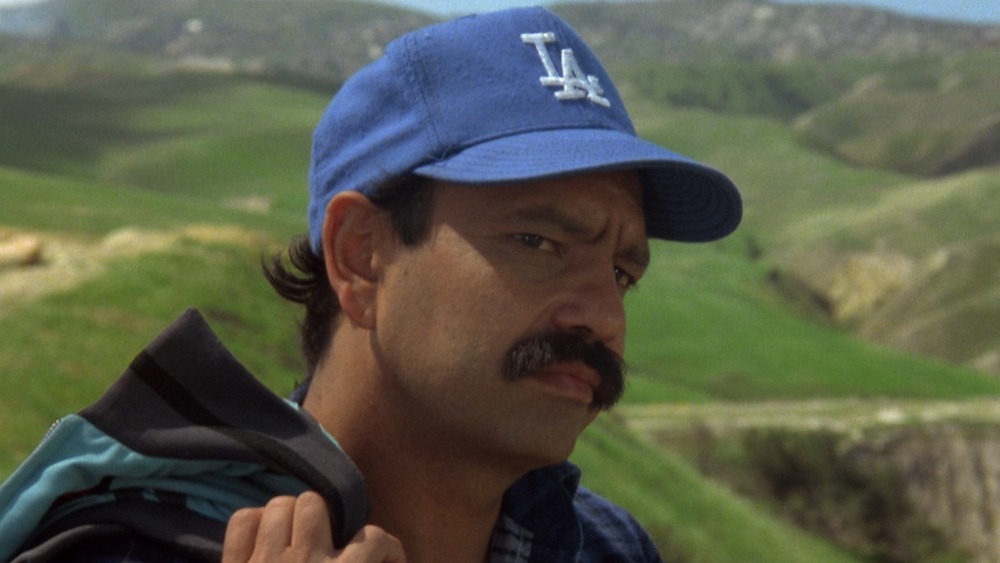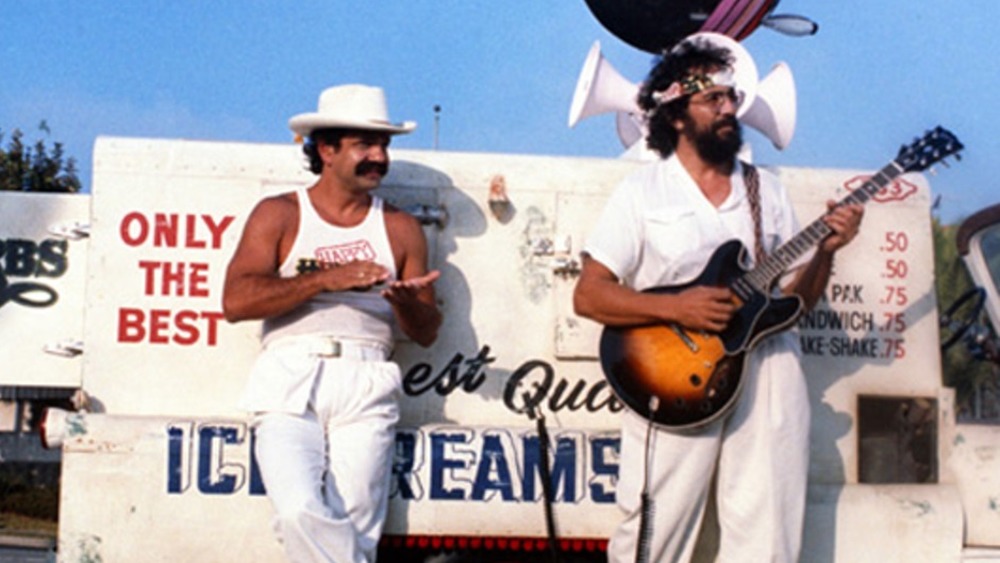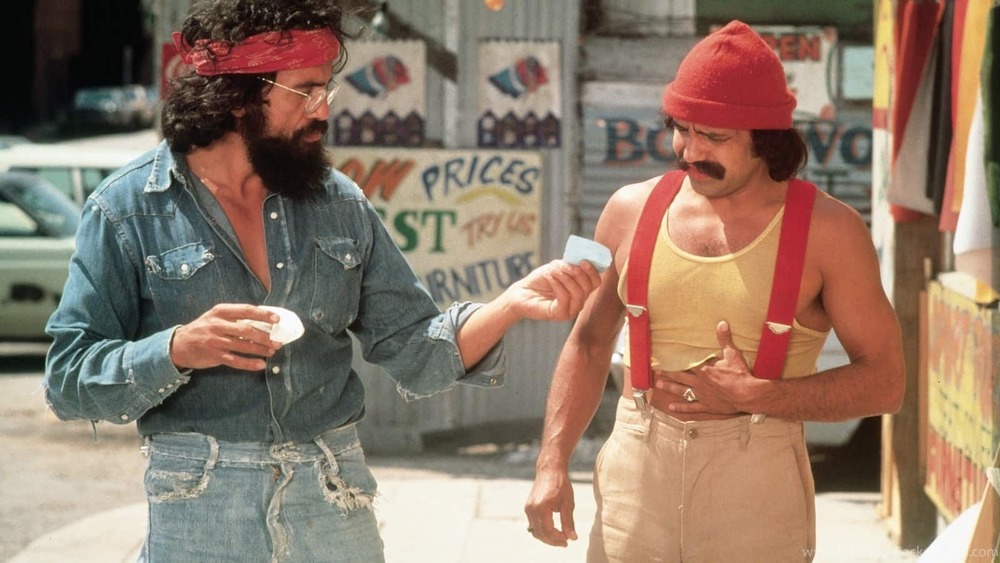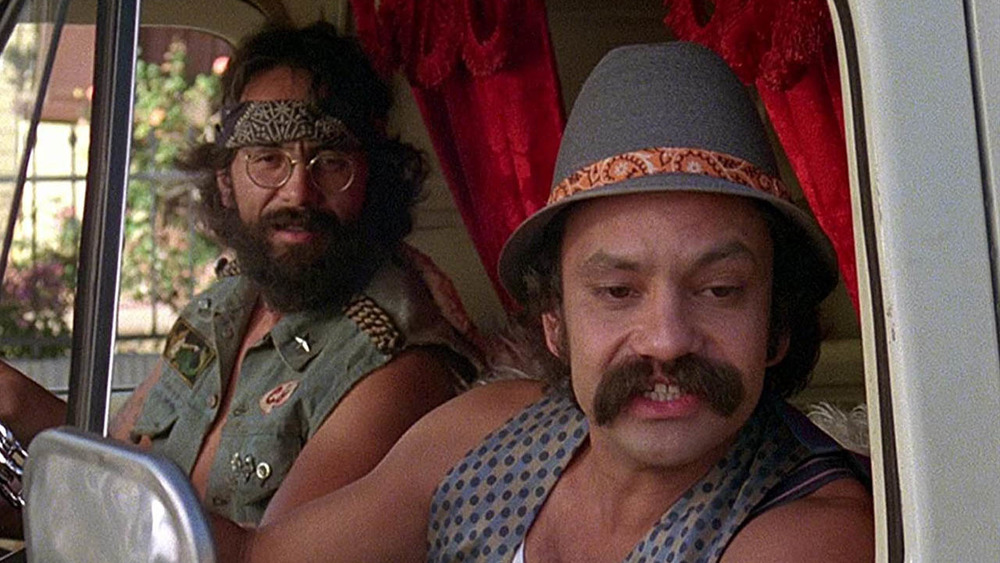Cheech And Chong Movies Ranked From Worst To Best
If there were ever to be a Stoner Comedy Hall of Fame, the first two inductees would have to be Richard "Cheech" Marin and Tommy Chong. In an alternate universe, the duo may have charted a very different career path; when they met in Vancouver, Canada in the late '60s, Chong was an aspiring musician, and had even scored a minor hit in 1968 while signed to Motown Records with his band Bobby Taylor and the Vancouvers. Cheech and Chong began their professional relationship as a musical act — but when their onstage banter proved to be a bigger hit with audiences than their songs, they decided that a change might be in order.
Throughout the early-to-mid '70s, the pair racked up a slew of hit comedy records. 1971's Cheech & Chong introduced their loopy, wordplay-heavy schtick to the world, 1972's Big Bambu was a major hit with the college crowd, and 1973's Los Cochinos scored them a Grammy award for Best Comedy recording. But when the demands of constant touring began to take their toll, Chong had a brilliant, possibly weed-inspired epiphany: to make a movie loosely adapting some of their best comedy bits into a rollicking, ridiculous odyssey of highness.
That film — 1978's Up in Smoke — is the reason we have Friday, How High, Half Baked, Pineapple Express, and literally every other stoner comedy you've ever had the good fortune to enjoy while partaking of a doobie or four (or none at all — we won't judge). Cheech and Chong would go on to field a slew of movies over the next decade and a half or so, including a few duds, a couple of solo efforts, and at least two bona fide comedy classics. Let's take a toke and check them all out, ranked from worst to... um... what was it again? Oh, yeah! Best.
Far Out Man is an uninspired, nearly Cheech-free effort
1990's Far Out Man likely would never have existed if Cheech hadn't decided, midway through the '80s, that he was ready to take a crack at mainstream comedy — a choice which Chong was in no way on board with, and which effectively led to the end of their partnership for decades. Written, directed by, and starring Chong (Cheech only makes a brief cameo), Far Out Man was almost certainly meant to be a triumphant return to the weed-infused silliness that the duo's fans loved them for. Unfortunately, the movie... how do we put this delicately? It sucked. Badly.
Chong was a credited screenwriter on every one of the pair's prior efforts, but he totally phoned it in with Far Out Man, hanging a series of tired gags on a barebones frame of a story about an aging hippie who travels cross-country on a quest to connect with his family. Despite a heaping helping of self-deprecation (the opening credits announce the film as "A Tommy Chong Attempt") and the involvement of some talented actors including C. Thomas Howell, Martin Mull, Judd Nelson, and Chong's daughter Rae Dawn Chong, the flick's labored efforts to bring the funny fell flat with all but the least discriminating weed-heads. In a 2019 interview with Inked, Chong seemed to acknowledge that the solo project was perhaps not the best idea. "It was tough. When we broke up, he had another movie to do and he was actually the one who broke the spell," Chong remembered. "So we broke up, then I made a movie called Far Out Man and had Cheech do a little cameo. That was harder than not having him in the movie because we work so well together."
Still Smokin' sees the duo at a low creative point
Speaking of laziness, here we have 1983's Still Smokin', the final proper Cheech and Chong movie — if indeed it could even be called that. It's more of a collection of weak sketches, held together by the most questionable of framing devices, leading up to an uninspired 20-minute segment of a live performance featuring routines that the pair's fans had already heard a hundred times prior.
The "plot," as it were, involves Cheech and Chong being invited to a Burt Reynolds and Dolly Parton film festival (of all things) in Amsterdam (of all places). Once they arrive, they're promptly mistaken for Burt and Dolly — try to stay with us here — and once the festival organizers realize they're actually Cheech and Chong, panic ensues. Fortunately, or perhaps not, the duo agree to put on a standup show to raise money for the inexplicably clueless promoters, a development which serves as a bizarre excuse to segue into the concert footage. This threadbare narrative is jarringly interspersed with sketches that were awkwardly unfunny in 1983, and have since aged like a hunk of cheese that's been left out in the sun for about a week.
Cheech and Chong were obviously never exactly loved by critics, but in the case of Still Smokin', those critics were particularly savage. (Wrote the legendary Gene Siskel, "Smokin' indicates Cheech and Chong's disrespect for their own audience and makes some of their other miserable films look good by comparison.") Perhaps it was the brutal reviews for this film that prompted Cheech to somehow convince Chong to take part in their next project — the movie that nearly torpedoed their partnership for good.
The pair took a stab at mainstream comedy with The Corsican Brothers
If Still Smokin' was the last proper Cheech and Chong flick, then 1984's The Corsican Brothers can only be described as... improper. This is because, for the first and only time, the duo departed from their established formula to make a straight-up farce, with less-than-stellar results. The movie's story is simply a spoof of the 1844 Alexandre Dumas novel of the same name, with Cheech and Chong playing the titular siblings (as well as a pair of down-and-out musicians who are being told the tale in the film's framing device). While the humor on display isn't too far removed from the pair's standard wordplay-heavy schtick, The Corsican Brothers is notable mostly for what it's missing — an omission which had Chong decidedly less than thrilled about taking part in the film, despite the fact that he co-wrote and directed it.
In a 1999 interview with A.V. Club, he was asked if there were any films that he and Cheech had made in which he was just going through the motions. Chong replied, "The Corsican Brothers. Cheech had already decided at that point that he wanted to stop doing dope humor. So, if you sit and watch The Corsican Brothers, you'll notice that there aren't any drug jokes." He went on to agree that making the film had contributed to duo's split, saying, "He wanted to do more acting and move away from the dope humor, and I wanted to continue doing what I was doing." The Corsican Brothers isn't terrible — but Cheech and Chong diehards responded to it in much the same way Michael Jordan's fans responded to his switch to baseball, and to date, it's the pair's final live-action film.
Cheech and Chong's Animated Movie! is as inessential as it gets
After The Corsican Brothers came a long period in which Cheech and Chong seldom worked together, and often outright trashed each other. But they eventually reconciled, and in 2013, they gave their longtime fans a gift of sorts: Cheech & Chong's Animated Movie!, which might have been cause for rejoicing had it featured, well, any new material. Unfortunately, the flick simply saw the guys warming over 18 of their previously released sketches — and the only reason the movie isn't ranked lower on this list is because, well, all those old sketches are still pretty freakin' funny.
The film was the brainchild of television producers and animators the Chambers Brothers, whose most notable credit is the 2004 Spike TV reality series The Ultimate Gamer. The film's animation is... fine, and Cheech and Chong commit wholeheartedly to their voice work, making the flick an inoffensive way to kill an hour and a half (especially if you happen to be mind-numbingly high). Adapted sketches include such classics as "Earache My Eye," "Sister Mary Elephant," "Trippin' in Court," "Acapulco Gold," and of course, "Dave" — but if you happen to have all of your old Cheech and Chong records laying around, there really isn't much reason to seek this one out.
Born in East L.A. is a surprisingly enjoyable, Chong-less mainstream flick
In 1985, Cheech briefly revisited his musical roots by releasing the novelty single "Born in East L.A." (credited to Cheech and Chong, although the latter was not involved), a parody of Bruce Springsteen's "Born in the U.S.A." which told the story of a smart-aleck L.A. resident who gets mistaken for an illegal immigrant and deported. Helped along by a hilarious video that spent some time in fairly heavy rotation on MTV, the tune was a minor hit — and Universal Pictures executive Frank Price, who had worked with Cheech and Chong while at Columbia Pictures, took notice. In his entertaining and awesomely titled 2017 memoir Cheech is Not My Real Name (But Don't Call Me Chong), Cheech recalled that Price was keen to expand the song into a feature — provided that Chong was not invited along for the ride. Since the pair were barely on speaking terms at the time, Cheech agreed, and in the summer of 1987, Born in East L.A. hit theaters.
Cheech portrays Rudy Robles, a good-hearted dude who finds himself shipped off to Mexico despite the fact that he's lived in L.A. all his life, and barely even speaks any Spanish. He tries to earn enough to pay his way back home by working at a strip club owned by a silver-tongued American named Jimmy (Daniel Stern) while romancing a waitress (Kamala Lopez), and of course, shenanigans ensue. The light-hearted, Chong-less flick was well-received by fans — and while it's often overlooked today, it's a far superior mainstream comedy to the ramshackle, half-baked Corsican Brothers.
Nice Dreams was a nice effort for the duo's fans
1981's Nice Dreams was Cheech and Chong's third feature effort, and while it didn't stray very far (or, well, even a few feet) from their established formula, it's safe to say that the duo knew what their audience was looking for. This time around, the dudes star as a couple of slackers who manage to get ridiculously rich selling primo weed out of an ice cream truck, with their recurring character Sgt. Stedanko (Stacy Keach) attempting to get the goods on them. Of course, he does this by partaking of the stuff in an attempt to get into the mindset of his quarry, which would only have made matters worse even if this particular strain didn't have the unfortunate side effect of turning its users into lizards.
After the pair accidentally sign away all of their money, they endure a series of wacky escapades, with an increasingly lizard-y Stedanko in pursuit, in an attempt to get it back. Bizarre sexual shenanigans, a segue through a mental institution, a raging LSD trip — Nice Dreams served up exactly what fans had come to expect, and it didn't even get totally trashed by critics, owing to its unabashed comedic anarchy and brisk pace. Released during a record-breaking summer (via New York Times) which included such blockbusters as Raiders of the Lost Ark, Superman II, and the James Bond movie For Your Eyes Only, Nice Dreams earned a respectable $37 million according to the Numbers, proving Cheech and Chong's box office clout — and leading to the release of one of their most overlooked movies the following year.
Things Are Tough All Over is the most underrated Cheech and Chong flick
Released in 1982, Things Are Tough All Over seems to get lost in the shuffle among even diehard Cheech and Chong fans, perhaps owing to its release smack in between the mostly excellent Nice Dreams and the mostly awful Still Smokin'. But even though the dope humor, sight gags, and non-sequiturs fans had come to expect were all present and accounted for, the flick represented the duo's most conventional comedy film yet — a buddy road comedy in which everything goes wrong in all the most hilarious ways.
The plot finds Cheech and Chong enlisted by their employers at a car wash, a pair of rich Arabs (also portrayed by Cheech and Chong), to drive a very special limo cross-country — one which happens to have a large amount of cash stashed in one of its seats. Of course, the hapless stoners are unaware of this, so they fund their trip by selling off pieces of the limo as they make their way from Chicago to Las Vegas. When they inevitably sell off the cash-stuffed seat, their employers are bent on revenge — but as we all know, it can be tough to pin down the whereabouts of a couple of blissfully clueless idiots who are wandering the Nevada desert, out of their minds on peyote.
Despite garnering the some of the best reviews of the duo's career, Things Are Tough All Over underperformed severely at the box office, pulling in only about $21 million according to the Numbers. It may have been the beginning of the end of Cheech and Chong as their fans knew and loved them, but it's a pretty damn funny flick — one of their very best, eclipsed only by a pair of classics.
Stoner comedy doesn't get much better than Up in Smoke
The film that started it all, 1978's Up in Smoke, could very well be sitting atop this list; it's really just a matter of personal preference, and (just perhaps) how baked one happens to be. Its plot, of course, is utterly simple: after being picked up while hitchhiking by Cheech's spaced-out stoner Pedro, Chong's character (whose name is Anthony, but who is referred to almost exclusively as "Man") gets sucked into a madcap adventure involving a crazed Vietnam veteran, an accidental deportation, a van literally made out of marijuana, and the most insane battle of the bands anyone is ever likely to see. Up in Smoke, though, functions less like a proper movie and more like a non-stop gag delivery device — and, as Cheech and Chong were red-hot on the standup circuit at the time, their schtick was as on point as it's ever been.
Ask any "head" who is familiar with the flick, and they're sure to rattle off a laundry list of their favorite bits: the ridiculously huge joint consisting of a mysterious weed strain called "Labrador," the chaotic courtroom scene presided over by a vodka-swilling judge, a whacked-out chick enthusiastically snorting a line of Ajax, and Keach's Sgt. Stedanko forgetting why he pulled over the van with the odd-smelling smoke coming from its tailpipe are all sure to merit a mention. There's a reason the film became an instant classic, as Cheech and Chong's comedic chemistry translated to the screen far better than anyone had any right to expect. The flick was an unexpected smash hit, and gave birth to a new film genre — but the single most gut-bustingly awesome movie the pair ever released arguably arrived two years later.
Cheech and Chong's Next Movie is just a stone-cold classic
After experiencing the madness that was Up in Smoke, fans were primed for Cheech and Chong's next movie, and in 1980, they got it — quite literally — and they were not disappointed. Cheech and Chong's Next Movie is, from beginning to end, an exercise in barely contained comic mayhem. From the opening sequence of the pair attempting to fill up their car from a trash can overflowing with pilfered gas, to the closing moments in which they ascend to space in a blunt-shaped UFO after partaking of "space coke," Next Movie never lets up for a second; that the film manages to cram so many gags into anything even resembling a cohesive narrative is nothing short of stupefying.
Once again, everyone has their favorite moments — whether it's Chong's hilarious and untimely misuse of a well-known Spanish pejorative, Cheech's acoustic ballad "Mexican Americans" and Chong's jaw-droppingly inappropriate rock version, Cheech's "kind of" cousin Red (also played by Cheech) telling the worst joke ever to a bunch of snooty society types and Chong's subsequent butchering of said joke at a comedy club, or any one of a million other inspired bits far too numerous to list, which pile up on top of each other before the audience even has a chance to get their bearings. Cheech and Chong's Next Movie may be the greatest stoner comedy ever made; by a hair, it's also the duo's highest-grossing film according to the Numbers, making it the commercial and artistic peak for two of the funniest guys of their era.
